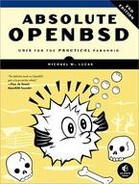- Advance Praise for Absolute OpenBSD, 2nd Edition
- Dedication
- About the Author
- About the Technical Reviewer
- Foreword
- Acknowledgments
- Introduction
- 1. Getting Additional Help
- 2. Installation Preparations
- 3. Installation Walk-Through
- 4. Post-Install Setup
- 5. The Boot Process
- 6. User Management
- 7. Root, and How to Avoid It
- The Root Password
- Using Groups
- Hiding Root with sudo
- Using sudo
- sudoedit
- The Biggest sudo Mistake: Exclusions
- sudo Logs
- 8. Disks and Filesystems
- Device Nodes
- DUIDs and /etc/fstab
- MBR Partitions and fdisk(8)
- Labeling Disks
- The Fast File System
- What’s Currently Mounted?
- Mounting and Unmounting Partitions
- How Full Is That Partition?
- Adding New Hard Disks
- 9. More Filesystems
- 10. Securing Your System
- 11. Overview of TCP/IP
- 12. Connecting to the Network
- 13. Software Management
- 14. Everything /etc
- /etc Across Unix Variants
- The /etc Files
- /etc/adduser.conf
- /etc/amd
- /etc/authpf
- /etc/bgpd.conf
- /etc/boot.conf
- /etc/changelist
- /etc/chio.conf
- /etc/csh.*
- /etc/daily and /etc/daily.local
- /etc/dhclient.conf
- /etc/dhcpd.conf
- /etc/disklabels/
- /etc/disktab
- /etc/dumpdates
- /etc/dvmrpd.conf
- /etc/exports
- /etc/fbtab
- /etc/firmware
- /etc/fonts/
- /etc/fstab
- /etc/ftpchroot
- /etc/ftpusers
- /etc/gettytab
- /etc/group
- /etc/hostapd.conf
- /etc/hostname.*
- /etc/hosts
- /etc/hosts.equiv
- /etc/hosts.lpd
- /etc/hotplug/
- /etc/ifstated.conf
- /etc/iked/, /etc/iked.conf, /etc/ipsec.conf, and /etc/isakmpd
- /etc/inetd.conf
- /etc/kbdtype
- /etc/kerberosV/
- /etc/ksh.kshrc
- /etc/ldap/ and /etc/ldapd.conf
- /etc/localtime
- /etc/locate.rc
- /etc/login.conf
- /etc/lynx.cfg
- /etc/magic
- /etc/mail/
- /etc/mail.rc
- /etc/mailer.conf
- /etc/man.conf
- /etc/master.passwd, /etc/passwd, /etc/spwd.db, and /etc/pwd.db
- /etc/mixerctl.conf
- /etc/mk.conf
- /etc/moduli
- /etc/monthly and /etc/monthly.local
- /etc/motd
- /etc/mrouted.conf
- /etc/mtree/
- /etc/mygate
- /etc/myname
- /etc/netstart
- /etc/networks
- /etc/newsyslog.conf
- /etc/nginx/
- /etc/nsd.conf
- /etc/ntpd.conf
- /etc/ospf6d.conf and /etc/ospfd.conf
- /etc/pf.conf and /etc/pf.os
- /etc/ppp/
- /etc/printcap
- /etc/protocols
- /etc/rbootd.conf
- /etc/rc.*
- /etc/relayd.conf
- /etc/remote
- /etc/resolv.conf and /etc/resolv.conf.tail
- /etc/ripd.conf
- /etc/rmt
- /etc/rpc
- /etc/sasyncd.conf
- /etc/sensorsd.conf
- /etc/services
- /etc/shells
- /etc/skel/
- /etc/sliphome/
- /etc/snmpd.conf
- /etc/ssh/
- /etc/ssl/
- /etc/sudoers
- /etc/sysctl.conf
- /etc/syslog.conf
- /etc/systrace/
- /etc/termcap
- /etc/ttys
- /etc/weekly and /etc/weekly.local
- /etc/wsconsctl.conf
- /etc/X11
- /etc/ypldap.conf
- 15. System Maintenance
- 16. Network Servers
- 17. Desktop OpenBSD
- 18. Kernel Configuration
- 19. Building Custom Kernels
- 20. Upgrading
- 21. Packet Filtering
- 22. Advanced PF
- 23. Customizing OpenBSD
- A. Afterword
- Index
- About the Author
- Copyright
Boot-Time Kernel Configuration
The config kernel editor is great when you know what you’re doing, but many of us aren’t that lucky or educated. When I’m trying to figure out how to fix a problem, I’ll frequently make a change, reboot to test the change, and see if things work.
OpenBSD lets you edit the kernel at boot time. You can try one boot with a kernel change, see if it works, and write your changes to the kernel. At the boot loader prompt, run boot -c.
boot > boot -c
You’ll get a couple lines of boot output, and then the kernel editor prompt.
ukc>
This works just like the config kernel configuration editor. Make any changes you want here, exactly as you would with config. When you quit the editor, the kernel should boot with the changes you’ve chosen.
The nice thing about boot-time edits is that they’re not permanent unless you later declare them so. If your changes don’t result in the desired behavior, reboot and try again. If your changes do solve your issue, however, you can write them to a kernel file.
The kernel remembers the changes you made in it. You can “replay” those changes in config by using the -u flag. Run config as if you were editing the kernel, but add the -u flag to replicate your boot-time changes.
# config -u -e -o /bsd.test /bsd
When you get your command prompt, enter quit to save your changes to your new kernel file.
Between sysctl and config, you should be able to make any OpenBSD-supported changes to the kernel. In the next chapter, we’ll cover how to make wildly unsupported kernel changes by rebuilding the kernel from source.
-
No Comment
